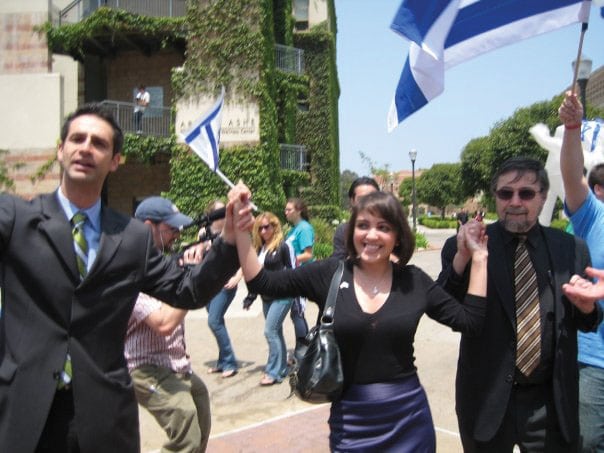 (lL-R): Then-Consul General of Israel Jacob Dayan, Tabby Refael and Judea Pearl dance in Bruin Plaza in 2008.
(lL-R): Then-Consul General of Israel Jacob Dayan, Tabby Refael and Judea Pearl dance in Bruin Plaza in 2008. “I want you to know that the first question I’m going to ask you tomorrow won’t be typical,” I forewarned Dr. Judea Pearl a few weeks ago, on the eve of our interview for this week’s cover story.
Pearl laughed, then responded, “Now, I’m intrigued.”
I had managed to intrigue a legendary scientist — one who has revolutionized artificial intelligence (A.I.) and who has won the Turing Award (known as the “Nobel Prize of Computing”).
As it turned out, the treasure trove of Pearl’s life meant that there would be two separate interviews, totaling nearly four hours. I wondered whether I was driving Pearl out of his mind with questions: What was the feeling on the streets of Bnei Brak when the [1948] War of Independence broke out? Will A.I., be the inevitable ruin of that which sets us apart from all else — our humanity? What are you ordering on Instacart these days?
I may have driven Judea Pearl out of his wits, but he made me fall in love with him all over again.
I may have driven Judea Pearl out of his wits, but he made me fall in love with him all over again.
At 85, he is one of the most fast-witted, clarity-driven, and funniest people I know. I first met him in 2006, when I was serving as Director of Academic Affairs for the Consulate General of Israel in Los Angeles. “This is the Dr. Pearl,” a colleague whispered in my ear during a Yom Ha’atzmaut (Israel Independence Day) celebration in the heart of UCLA, hosted by the wonderful student group, Bruins for Israel. Here was the legendary professor and researcher himself; one of the greatest forces behind how we tell computers to behave, and the father of Daniel Pearl, z”l. I was flooded with awe and a sense that he was supra-human, until I saw him dance.
Yes, dance. The students began playing electrifying Israeli music and Pearl joined hands with them and began dancing exuberantly. In that moment, I realized that Pearl, and everything about him, exudes life, sometimes directly in the face of his enemies, who exude death. He was, in fact, extraordinarily human.
In Bruin Plaza, we were surrounded by anti-Israel students. These were the same students who couldn’t bring themselves to publicly call out and condemn the very Islamic fanaticism that had robbed Pearl, his wife, Ruth, and their family of their beloved “Danny” in Pakistan in 2002. Clad in black and holding signs calling Israel “apartheid,” as they watched the celebrations of Israel, the students looked miserable.
I realized that Pearl, and everything about him, exudes life, sometimes directly in the face of his enemies, who exude death. He was, in fact, extraordinarily human.
And there was Judea Pearl, dancing more joyously than anyone else, even the diplomats he called into the ring of dance. There was something that set his dancing apart from the American-born Jewish students, the Israeli-born diplomats who were in their 30s, and me, an Iranian-born Zionist who was in her 20s. And only now, after nearly two decades, countless run-ins, and two intensely meaningful interviews, do I understand what made Pearl’s dancing so different: He didn’t seem to give a damn what anyone thought of Israel.
The students, while espousing pride that inspired us all, nevertheless seemed a little uncomfortable surrounded by such hate; the diplomats, despite their patriotism for the country they served, still took full note of the hostile anti-Israel students (nothing could have prepared them for the unique hate against Israel at some California campuses). As for me, I danced with reservation; the angry dispositions and venomously propagandistic (and untrue) images on the students’ posters reminded me of the trauma of having lived in post-revolutionary Tehran. Bruin Plaza and Tehran?
You can understand why I was reluctant. Back in Iran, Zionism is a crime punishable by death. That’s a big price to pay for some innocent dancing. I hope at least one or two administrators at UCLA are reading this, especially the team at Equity, Diversity & Inclusion.
But Judea Pearl wasn’t born in Iran nor in America;. he was born a sabra (a native to Israel) in 1936, in what was then-called Mandatory Palestine, to a family who had prayed for a “return to Zion” for two millennia. And in 1948, while his Polish-born family was celebrating the re-establishment of the State of Israel in the streets, a young Pearl didn’t even see why it was such a big deal: “For us young sabras, we already had a state in our minds and infrastructure on the ground,” he told me a few weeks ago.
And there you have it. An unabashedly proud Zionist who, just by being himself, makes Zionism as natural as anything else on earth.
For the record, Pearl doesn’t dismiss anti-Israel student voices; in fact, he knows exactly with whom he’s dealing. And he works well into the middle of the night finding ways to make the word “Zionist” noble on campus again.
In 2008, a few years after that celebration, I danced again with Pearl, diplomats, students (and Hillel staff) in Bruin Plaza for Yom Ha’atzmaut. I felt like an invisible thread was holding all of our arms and legs together, and I even felt like the soul of Danny was there, too, no doubt playing an instrument (he was a gifted musician).
Oh, how I would have loved to have seen a few other professors in that dance of unabashed and natural pride.
Tabby Refael is a Los Angeles-based writer, speaker, and civic action activist. Follow her on Twitter @RefaelTabby























 More news and opinions than at a Shabbat dinner, right in your inbox.
More news and opinions than at a Shabbat dinner, right in your inbox.